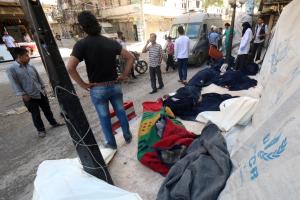Aleppo (Syria) (AFP) - Barrel bombs dropped from regime helicopters killed at least 71 civilians in Syria's Aleppo province Saturday, after forces loyal to President Bashar al-Assad retreated from the neighbouring northwestern region of Idlib.
The Syrian Observatory for Human Rights said "at least 71 civilians were killed, and dozens were wounded, when regime helicopters dropped barrel bombs on the city of Al-Bab and in Al-Shaar in east Aleppo city".
Rami Abdel Rahman, the director of the Britain-based monitoring group, said 12 people were killed in rebel-held Al-Shaar, including eight members of a single family.
The bodies of those slain were laid out on the streets of the neighbourhood, with the limp blood-covered hand of one of them protruding from under a blanket, said an AFP correspondent at the scene.
Bulldozers were used to clear away the rubble by civil defence volunteers.
One of them, Shahud Hussein, said the blasts were so powerful that buildings in the neighbourhood were "likely to collapse".
The other 59 civilians, all male, were killed at a market in Al-Bab, Abdel Rahman told AFP.
Al-Bab lies about 40 kilometres (25 miles) northeast of Aleppo city and is controlled by the extremist Islamic State group.
"People often gather on Saturday mornings at the Al-Hail market in Al-Bab, which is why the number of dead was so high," said Abdel Rahman.
Those killed were all male because women have much less freedom of movement in IS-controlled areas, he added.
- 'Rapid retreat' -
Barrel bombs are crude weapons made of oil drums, gas cylinders or water tanks packed with explosives and scrap metal usually dropped from helicopters.
View gallery

Civilians stand next to the bodies of those killed in a reported bomb barrel attack by the Syrian ai …
These weapons, which rights groups have criticised as indiscriminate, have struck schools, hospitals, and markets.
But Saturday's death toll was particularly high.
"This is one of the biggest massacres that regime planes have committed since the beginning of 2015," said the Syrian Revolution General Commission activist group.
The Observatory said regime forces also dropped barrel bombs Friday in Idlib province, now under the de facto control of rebels after the Army of Conquest alliance captured the city of Ariha and surrounding villages.
The brutal tactic of carrying out air attacks on built-up areas after battleground losses has become common for Syria's regime, and it has ceded swathes of territory lately.
Following defeats in Idlib's provincial capital and at a massive military base nearby, government forces also lost the ancient city of Palmyra to IS jihadists on May 21.
Abdel Rahman said the rebels' "lightning offensive" in Ariha saw a swift withdrawal of Syria's army and its allies from the Lebanese Shiite Hezbollah movement.
"We can't even say there were real clashes with the government in Ariha," he said.
In Idlib, the government still controls the Abu Duhur military airport and a sprinkling of villages and army posts.
"For the regime, the vital territory to be protected is Damascus, Homs, Hama and the coast. Idlib is no longer (vital), which explains the rapid retreat from Ariha," a security source told AFP.
- Restrictions on fleeing IS -
The Syrian conflict erupted in 2011 with a popular uprising that descended into a complex civil war that has killed at least 220,000 people.
Syria's neighbours have been affected by the rising instability and refugee influx.
In Iraq, government authorities are blocking thousands of families from escaping clashes between IS and anti-jihadist forces in the country's west, Human Rights Watch said Saturday.
"Since April 2015, the government has imposed restrictions on entry into Baghdad and Babylon provinces affecting just under 200,000 people fleeing fighting" in Ramadi, the group said in a statement.
It said the restrictions effectively discriminated against Sunni Arabs, which make up a majority of Ramadi's Anbar province.
"Prime Minister Abadi should immediately order these restrictions lifted so that all Iraqis can seek refuge in Baghdad, regardless of origin or religious affiliation," said HRW deputy Middle East director Joe Stork.
And in Turkey, Prime Minister Ahmet Davutoglu described as an election ploy the release of images allegedly showing Turkish intelligence trucks delivering weapons into Syria last year.
"I said at the time it was made up of logistical aid directed for the Turkmen community in desperate need of help," Davutoglu told AFP.
"The release of (the video footage) right now is an effort aimed at affecting the elections," he added.
In January 2014, security forces searched trucks near the Turkish-Syrian border on suspicion they were smuggling arms into Syria, and found Turkish national intelligence personnel on board.
NOTE: Take a look HERE for more.